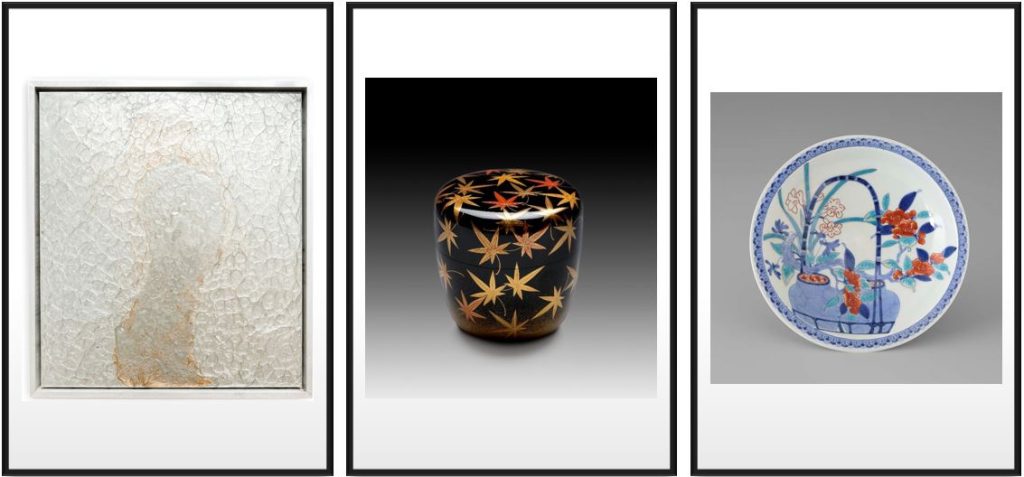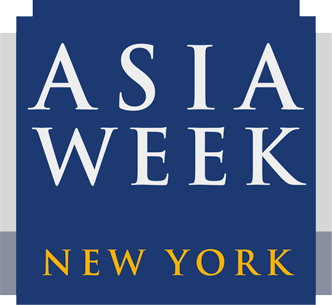
L-R: Hisao Hanafusa, Fifth Dimension-QM7, 2019, aluminum paint on canvas, 24 x 19 1/4 in. (61 x 49 cm), Fu Qiumeng Fine Art; Gold Lacquer Tea Caddy with Autumn Leaves, maki-e gold lacquer, 1990s, 3 x 3 x 3 in. (7.7 x 7.4 x 7.4 cm), Thomsen Gallery; and Nabeshima Plate with Polychrome Decoration, Edo Period (1690-1740), Dia: 20.5cm, Zetterquist Galleries
Japanese and Korean Ceramics, Zetterquist Galleries
Concludes December 15
The Japanese section spotlights excellent and rare examples of several important kiln-types, starting with an unusually large Jomon ritual food container dating to 3500-2500 BC, continuing on to Medieval stonewares from Bizen, Tokoname and Mino kilns that illustrate their continued use in the Japanese tea ceremony, and Japanese porcelains of two different types: Nabeshima-type and Kokutani-type.
A group of Korean Koryo Dynasty celadons is highlighted with a large rectangular tile with inlaid decoration of birds and foliage, one of only three such pieces known in the United States.
Read more, click here
Golden Treasures: Japanese Gold Lacquer Boxes,
Thomsen Gallery
Concludes December 16
The exhibition features exceptional works with designs in maki-e, which literally means “sprinkled pictures” and refers to the technique of sprinkling powders of gold and silver onto wet lacquer, a uniquely Japanese tradition that developed in the Heian Period (794–1185).
Read more, click here
Hisao Hanafusa: Borrowing Nature’s Powers, Fu Qiumeng Fine Art
Concludes December 17
Hisao Hanafusa: Borrowing Nature’s Powers is a solo exhibition of the Japanese-American artist’s most recent projects Cosmic Memory and Fifth Dimension, as well as examples of his highly acclaimed carpentry works. The two projects re-introduce Hanafusa through the East Asian way of borrowing nature’s strength and making it one’s own. Although the method of using natural processes to complete the work has been present in his work since the 1960s, it has never drawn significant attention. This exhibition foregrounds this methodology of power borrowing, and offers the audience an intrinsic and essentially philosophical way of understanding Hanafusa.
The exhibition is curated by Dr. Tingting Xu, the Arnaldo Momigliano Postdoctoral Scholar in the Division of Humanities at The University of Chicago. An exhibition catalog is available, including Dr. Xu’s introductory essay and her interview with Hanafusa.
Read more, click here
